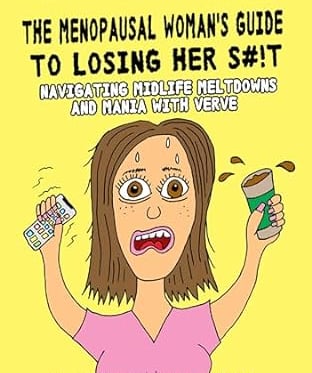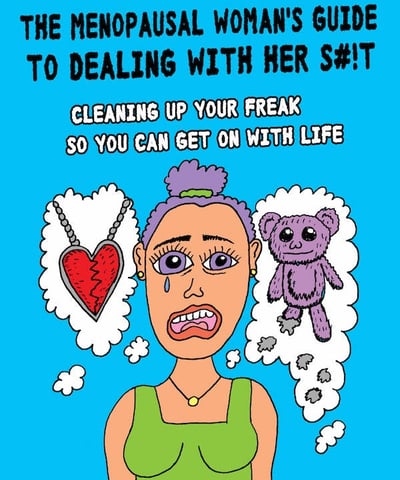Menopause Belly: How It Happens & What to Do About It
Menopause belly isn't just about weight gain. It's also about a redistribution of fat in our bodies. Here's what's happening hormonally and otherwise.
MENOPAUSAL DEPRESSION
Kennerly Clay
12/22/20248 min read


That stubborn pouch that seems to appear out of nowhere during our midlife transition? That would be “menopause belly.” If you've noticed a sudden expansion in your midsection, it may make you feel (only slightly) better that 87% of women report weight gain and body changes during menopause.
It’s no wonder so many women deal with depression in menopause. Aside from life stressors and hormonal havoc, there's "unexplained" weight gain - usually right around the middle. But what exactly is this phenomenon, and why does it happen?
If you or someone you know is in crisis, please call 988, the Suicide & Crisis Lifeline in the United States.
What is menopause belly?
Menopause belly, affectionately if not sarcastically called "meno belly," is the increase in abdominal fat that many women experience during perimenopause and menopause. It's not just about weight gain, though – it's also about a redistribution of fat in our bodies.
As Dr. Stephanie Faubion, director of the Mayo Clinic Center for Women's Health, explains, “Menopause does result in body fat distribution changes, with a preferential deposition of body fat centrally, and an increase in abdominal obesity.”
This shift in body composition is primarily due to hormonal changes. As we enter menopause, our estrogen levels take a nosedive, which can lead to an increase in abdominal fat. At the same time, our muscle mass starts to decline, slowing down our metabolism. It's like our bodies are playing by a whole new set of rules - and guess what? You have no idea what they are.
Menopause survival tip sheet
The Menopause Madness Relief Kit is a hand-curated list of menopausal survival tips from women who've been to hell and back.


Can you get rid of menopause belly?
Now, here's the million-dollar question: Do our menopause bellies ever go away? Experts will always tell you to focus on a combination of diet, exercise, and lifestyle changes. (We’ll fill you in further down on what nobody seems to address, unless you’re working with healthcare provider who has a deep understanding of metabolic syndrome and the myriad factors at play at this time in your life.)
Here are the “oh, thanks Tips, like we didn’t know this already and tried it a million times and it makes no freaking difference” recommendations include:
Diet - Opt for a Mediterranean-style diet rich in fruits, vegetables, whole grains, and lean proteins. This eating pattern has been shown to be effective for weight loss and overall health.
Exercise - Incorporate both aerobic exercise and strength training into your routine. This combo helps burn calories and build muscle, which can boost your metabolism.
Stress management - Practice stress-reduction techniques like meditation or yoga. High stress levels can contribute to abdominal fat accumulation.
Sleep - Prioritize getting 7-9 hours of quality sleep each night. Poor sleep can disrupt hormones that control hunger and fullness.
Let’s break this down: Diet, okay, yeah, eating Mediterranean style is great and all, but when somebody tells you to eat less and exercise more in menopause, you wanna bitch slap them because you can’t fathom eating less (you’re ravenous for fuck’s sake) and you can’t imagine exercising any more than you already do, because you’re fucking exhausted.
Stress management? Seriously? Who’s not stressed out of their gourds when their bodies are wreaking havoc on every aspect of life, from mental health to weight gain, along with life stressors like career survival, difficulties with spouse or partner, aging parents, and teenage kids who are also hormonal hot messes.
Oh and don’t get us started on sleep. Ask any menopausal woman if they’ve slept for seven uninterrupted hours in the last 10 years and they’ll laugh in your face. We’re lucky to make it to the 3:30 am wake-ups without having to get up and pee or poke our snoring partner or just lie there wide awake, yet again.
(Wait for it, more to come on what actually works when you've tried and failed at all of the above.)
When somebody tells you to eat less and exercise more in menopause, you wanna bitch slap them because you can’t fathom eating less (you’re ravenous for fuck’s sake) and you can’t imagine exercising any more than you already do, because you’re fucking exhausted.
Will taking estrogen reduce belly fat?
Ah, if only it were that simple! While hormone therapy isn't a magic bullet for weight loss, it can indirectly help with weight management. The Menopause Consortium states, “Contrary to popular belief, MHT does not inherently cause weight gain. In fact, studies have shown that MHT can help mitigate some of the changes associated with menopause, including weight gain and redistribution of body fat.”
It's important to note, of course, that hormone therapy isn't suitable for everyone. It's typically recommended for women who are perimenopausal, within 10 years of their last menstrual period, or younger than 60 years old, according to Jean Marino, CNP, a menopause specialist at University Hospitals. Always consult with your healthcare provider to determine if hormone therapy is right for you.
What burns menopausal belly fat?
Here are some evidence-based strategies to help you burn stubborn abdominal fat, with the caveat of course, that sometimes doing all of this ad nauseum seems to make no effing difference:
High-intensity interval training (HIIT) - This type of exercise has been shown to be particularly effective for burning belly fat.
Strength training - Building muscle can help boost your metabolism and burn more fat, even when you're at rest.
Eating more protein - A high-protein diet can help reduce cravings and boost metabolism.
Getting enough fiber - Fiber-rich foods can help you feel full and satisfied, reducing overall calorie intake.
Limiting added sugars - Excess sugar consumption has been linked to increased abdominal fat.
Remember, spot reduction isn't possible – you can't target fat loss in one specific area. Instead, focus on overall health and fitness, and the belly fat will likely decrease along with fat from other areas of your body.


What is the latest on weight loss drugs for the average person?
As of this writing, several weight loss drugs are currently available, with some being used off-label for weight management in non-diabetic people:
Semaglutide (Wegovy, Ozempic) - FDA-approved for weight loss in adults and children 12 and older with obesity or overweight adults with weight-related conditions12. Ozempic, primarily for diabetes, is often prescribed off-label for weight loss.
Tirzepatide (Zepbound, Mounjaro) - Recently approved by the FDA for treating obstructive sleep apnea in obese adults23. It's also used off-label for weight loss, showing potentially greater and faster results than Wegovy in early trials4.
Liraglutide (Saxenda) - Approved for long-term weight management.
These GLP-1 receptor agonists have shown impressive weight loss results, with many people losing 10% to 20% of their body weight. The challenge, however, has been that availability can be an issue due to high demand and shortages. Insurance coverage varies, and some patients resort to ordering from international sources.
Other options include older medications like phentermine-topiramate (Qsymia) and naltrexone-bupropion (Contrave). These drugs typically result in 5% to 7% body weight loss when combined with diet and exercise. It's important to note that these medications should be used under medical supervision and in conjunction with lifestyle changes.
Who qualifies for weight loss medications and how much do they cost?
To qualify for prescription weight loss medications like Wegovy or Ozempic, you generally need to meet the following criteria:
Body mass index (BMI) of 30 or higher
BMI of 27 or higher with at least one weight-related health condition (e.g., high blood pressure, diabetes, high cholesterol)
Regarding costs:
Wegovy (semaglutide for weight loss): $1,349.02 per month (28-day supply) without insurance68
Ozempic (semaglutide for diabetes, used off-label for weight loss): $936 per month without insurance
Rybelsus (oral semaglutide): $936 per month without insurance
These prices are significantly higher in the U.S. compared to other countries. For example, Ozempic costs about $169 in Japan and even less in countries like Sweden, the UK, Australia, and France.
With insurance coverage, costs can be substantially reduced. Some patients may pay as little as $0, depending on their insurance plan and their eligibility. It's important to note that insurance coverage for these medications varies, with some plans having specific criteria or requiring step therapy. You should consult with your healthcare provider and insurance company to determine your eligibility and potential costs.
According to the author of this article, “The only thing that has made a difference for my menopause belly is working with a qualified weight management MD who prescribes me weight loss medications.”
So now what?
Seek out a qualified healthcare provider whom you trust. If you've tried diet and exercise and lifestyle changes and nothing seems to be working, it's time to find an MD who specializes in weight management or a functional and integrative MD who can help guide you from a whole-body standpoint.
Keep in mind you're part of a community of women experiencing similar challenges. Sharing your experiences with friends or joining support groups can provide comfort, encouragement and intel gleaned from others’ experiences.
Author’s side note
From my own experience, having used both Wegovy, Ozempic, and generic versions of semaglitude, Wegovy produced the best result, meaning weight loss was slow and steady and I truly lost my appetite. I had to be very conscientious about eating enough, especially protein. My original weight loss was from 170+ pounds down to 127 pounds, which I hadn’t weighed since my teenage years. When I went off the medications due to loss of health insurance coverage (and scarcity of the drugs in the marketplace), my appetite returned and I started to regain weight.
Thankfully, I have the resources to obtain semaglitude from a reputable provider, but now I have to pay out of pocket to the tune of nearly $500/month (and a three-month commitment). For me, however, keeping my weight down has immeasurable benefits and a tremendously positive impact on my mental (let alone physical) well-being. Thus, I will continue to pay out of pocket and consider metabolic syndrome issues to be lifelong - so I will take the medication for life, as long as it’s available to me.
Hopefully, the cost will come down for the masses and the obesity epidemic will be brought under control in a way that’s transformative, producing healthier, happier people.
The information provided in this blog post is for educational purposes only and should not be considered medical advice. Every individual's situation is unique, and what works for one person may not be suitable for another. Always consult with a qualified healthcare provider before making any changes to your treatment plan or starting new medications. Your healthcare provider can take into account your personal medical history, current health status, and other individual factors to determine the most appropriate course of action for your specific needs.
Wanna connect further on menopause belly?
About the author
Kennerly Clay is the author of The Menopausal Woman's Guide series, a snarky trilogy for women who are losing their shit in peri/menopause. Her focus is on all things mental health, financial health, and personal growth during the menopausal years.
Books for women who are losing it in menopause
Mental Health
Losing your mind in peri/menopause?
The menopausal woman's guide series
Financial Health
Had enough of financial insanity?
Personal Growth
Triggers? Old stuff kicking up?
Related topics
Explore helpful articles, tips, and advice for women who are losing their shit in menopause.
Community
Stay Connected
© 2024. Eclectic Content, Inc. All rights reserved.








